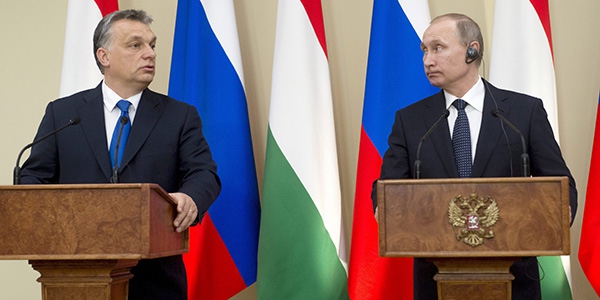
Prime Minister calls Paks expansion the “deal of the century”
17 February 2016
Following talks on Wednesday with President of Russia Vladimir Putin at his state residence near Moscow, Hungarian prime minister Viktor Orbán said that his country’s cooperation with Russia on the expansion of the Paks Nuclear Power Plant was the agreement and deal of the century.
The Prime Minister was speaking at a joint press conference with the Russian president following several hours of negotiations in Novo-Ogaryovo. He said that Hungary views international debate on the Russian-Hungarian agreement on the Paks expansion to be unnecessary, in view of the fact that the two countries have been working together in the field since the 1960s, and are now doing nothing more than extending their existing cooperation.
Instead of criticism, we instead owe Russia a debt of gratitude for being prepared to extend cooperation, he said.
Hungarian-Russian relations are developing well, but this is a “true miracle”, Mr. Orbán said. He explained that Russian-Hungarian bilateral relations have to be improved year-by-year in an unfavourable international environment.
The success of these relations stems from a feeling of responsibility, the Prime Minister said, because “Russia’s energy exports are so closely tied to the operating requirements of Hungarian industry that they are practically inseparable”. Without good Russian-Hungarian relations the Hungarian economy and Hungarian industry cannot function, he pointed out, adding that for this reason good Hungarian-Russian economic relations are in the interests of the Hungarian people.
“Russia is not Hungary’s enemy, but one of its partners. Russia is not threatening our homeland, but is offering an opportunity for partnership and cooperation, which is one of the prerequisites for our economic success”, said the Prime Minister, who added that the fact the two countries review their cooperation once a year at the highest possible level is an established political custom.
The Prime Minister said that he felt progress has been made in practically every area of bilateral relations, adding that the only backsliding has occurred in the field of trade, which was not in fact the fault of either of the two countries.
Mr. Orbán spoke about the fact that the Hungarian pharmaceuticals industry has found excellent opportunities in Russia, in addition to which the automobile and machinery industries have also gained the opportunity to develop partnership ties with leading Russian enterprises.
The Prime Minister also spoke about the significance of Russia filling the 200 university scholarship places offered by Hungary ahead of schedule, because this also serves long-term relations between the two countries.
According to the Prime Minister, in the important issues of global politics it is impossible to ignore Russia. Hungary greatly appreciates efforts to resolve the situation of crisis zones and “to halt the generation of millions of migrants”.
In reply to a question on migration, Mr. Orbán explained that as a result of events indicating reduced security in Europe, more and more European citizens understand – and indeed support – Hungary’s stance.
He confirmed that the Hungarian standpoint is that massive uncontrolled flows of immigrants are bad for Europe. The Prime Minister declared that Schengen regulations must be upheld and that “Christian and national values will remain important values in future”.
Mr. Orbán also indicated that there is great debate in Europe over whether anyone outside the country should be able to decide “who we Hungarians want to live with”. Hungary’s standpoint on this issue is that “nobody can be forced to coexist with people whom they do not wish to live with”, he stated.
The Prime Minister also said that Hungary has undertaken to contribute to the handling of the Syrian situation by financing construction and operation of a hospital in Syria.
In reply to a question concerning economic sanctions between the EU and Russia, the Prime Minister said that in his opinion it is not possible to automatically extend EU sanctions against Russia beyond the middle of the year without holding an open debate on the issue. More and more EU Member States in addition to Hungary agree on this, he said, stressing that Hungary remains a loyal member of the European Union.
Economic growth in the European Union is slow, and accordingly the bloc cannot afford the luxury of not cooperating with everyone who can make its economy more dynamic, Mr. Orbán said.
summarising his standpoint, the Prime Minister said that “All rational arguments point to the fact that we must eventually develop cooperation”, adding that he thinks there is a chance that “recognition of the need for cooperation” could also be followed by political action.
Cabinet Office of the Prime Minister/MTI



